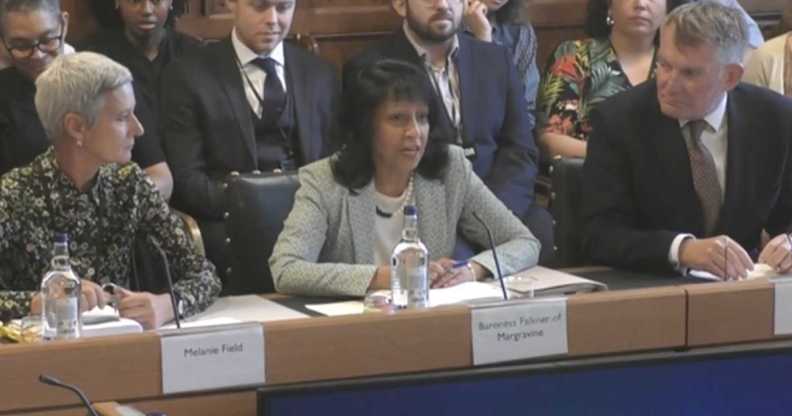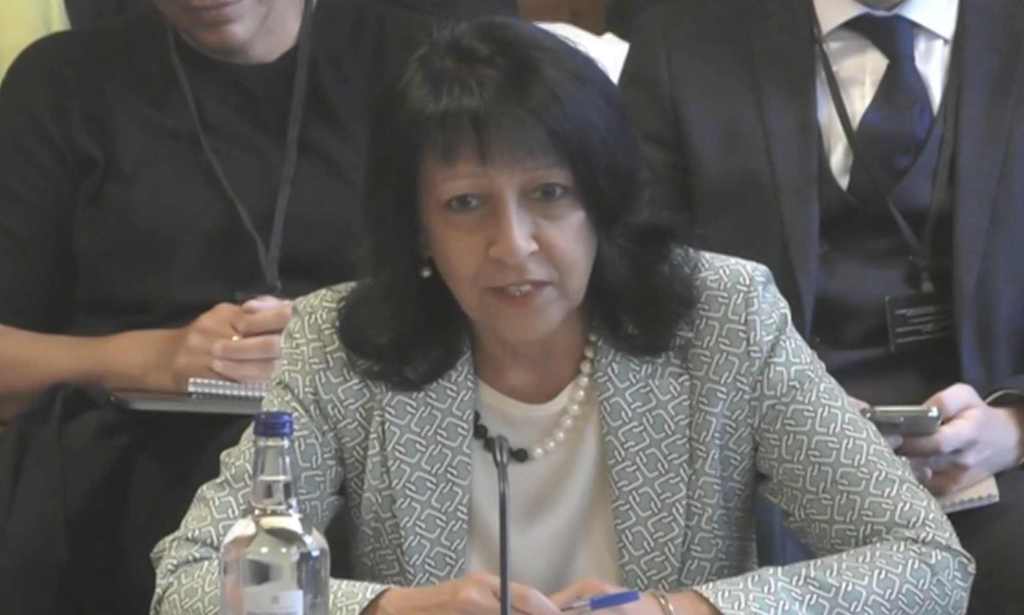Government’s job to decide the definition of sex in Equality Act, says EHRC boss

EHRC bosses were questioned by members of the Women and Equalities Committee (PinkNews/Gov)
The chair of the UK’s equality watchdog has told MPs it is the job of government to define what sex means under the Equality Act, not them – despite the organisation previously offering in-depth, controversial advice on the issue.
On Wednesday (12 July), top bosses from the Equality and Human Rights Commission (EHRC), the UK’s equality watchdog, faced questions from MPs.
As part of its regular scrutiny of the EHRC, cross-party members of the Women and Equalities Committee questioned chairwoman Baroness Falkner, chief executive Marcial Boo and executive director Melanie Field about the day-to-day running of the organisation.
Areas covered in the committee hearing included the definition of sex in the Equality Act 2010 and the issue of staff retention within the organisation, particularly if LGBTQ+ staff were more likely to leave.
The first part of the hearing saw Falkner face in-depth questions from Carshalton and Wallington MP Elliott Colburn over what influenced EHRC’s discussions around the definition of sex and processes they undertook upon receiving a request for advice from the minister for women’s and equalities.
The notion of altering the definition of sex in law came to public attention following a request for advice from women and equalities minister Kemi Badenoch in February on clarifying a “technical and contested area of law” – effectively how the Equality Act defines sex.
However, as clarified by Falkner during the hearing, this topic was something the EHRC was discussing prior to Badenoch’s correspondence.
In a response published in April, the EHRC stated it believed it would bring “greater legal clarity” to define ‘sex’ as ‘biological sex’. The organisation said the clarity would be seen in a number of areas, including single-sex spaces, excluding “trans women from women’s sport” and so-called “freedom of association for lesbians and gay men”, and thus “therefore merits further consideration”.
However, the equalities watchdog also noted changing the definition had the potential to cause disadvantages and ambiguity in other areas. For example, the redefinition could allow trans men to lodge equal pay complaints which are currently reserved for women.

Colburn asked Falkner to “humour” him and asked what the EHRC’s definition of biological sex actually means.
In response, Falkner told the committee the watchdog “didn’t define” biological sex saying the EHRC believes that is a matter for the government to “define what its terms are”.
However, despite stating the definition is not for the EHRC, Falker proceeded to offer a view on what biological sex entails.
She said: “I think most people would recognise that biological sex is a categorisation which accords with reproductive functions.
“So, for example, […] a woman is recognised as being with one sex in the Equality Act. A woman is a person whose body is designed to produce eggs and a man is a person whose body is designed to produce sperm.
“I think that’s the way most people would understand it.”
She added the EHRC are “not scientists” and what she just said was not the “definitive word on it”.
Falkner continued: “It is for government to decide how they wish to define it. They asked us the question, to look at sex in the Equality Act.
“It’s for them to come to a view on what they mean by that, not us.”
Falkner’s words echo comments made by Field in the wake of the EHRC’s correspondence with Badenoch.
When questioned by TransActual chair Helen Belcher, the executive director said there is a “definitional issue if the government wished to act on the letter”.
During the committee hearing, Colburn queried if Falkner is in any way “concerned” that the EHRC’s “advice is based off a definition which you aren’t prepared to come to yourself as an organisation?”.
The chair said it was “routine and normal” for the EHRC to offer advice to the government, adding later on “it is a normal thing for us to interact with the government equalities office and the government on any legislation”.
EHRC accused of offering government a ‘formula’ to discriminate
The EHRC has been at the centre of much ire in recent months over its policies relating the trans people.
Upon the publication of the organisation’s advice to the government, trans people were left fearful that their rights could be impacted by a change to the definition.
In April, Belcher said the letter suggested the EHRC is “keen to assist in the redefinition” of the word “woman” – which has been “understood to include trans women for many, many years” – in a move “driven by political desire and manufactured fear more than any systematic evidence”.
“Our challenge to the increasingly misnamed EHRC and [Kemi Badeoch] is: why it is necessary now to try to redefine ‘woman’ to exclude trans women (and include trans men) when there is no evidence of problems actually caused by the understanding that has existed for decades?” she asked.
Cleo Madeleine, communications officer for Gendered Intelligence, described the content of the letter as “alarming” and “gutting” but noted that it is ultimately just advice and nothing has currently changed in regards to the rights of trans people.
In May, the organisation was blasted by the UN independent expert on sexual orientation and gender identity, Victor Madrigal-Borloz, who said he was shocked the equalities watchdog does not have a working definition of biological sex.
“UK law provides no such definition either,” he wrote. “The EHRC however specifically conceded that, in the context of the letter, the intended meaning of the term ‘biological sex’ is to define women as ‘women who are not trans’.”
Currently, the Equality Act protects against discrimination on grounds of sex by which trans women basis of sex-based discrimination because of their womanhood.
If the government were to change this definition then this would no longer be possible, even for trans women who have a Gender Recognition Certificate (GRC).
Madrigal-Borloz continued: “Under the Equality Act, […] a trans woman who does have a GRC is a woman under the current case law.
“If the government decides to make the amendment, they don’t need to define biological sex, they can do it by way of exclusion of the [Gender Recognition Act].”
“It then follows that the objective of the EHRC was to offer the government a formula through which it could carry out discriminatory distinctions currently unlawful under UK law, and that will remain so under international human rights law,” he added.
How did this story make you feel?

